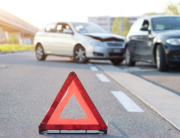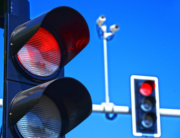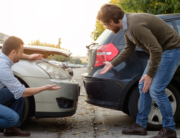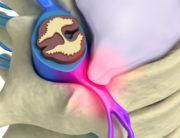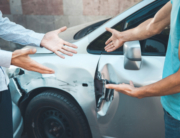It can be tricky to determine who has liability for intersection accidents in Florida. Responsibility will be determined by the facts of the individual case. Different types of intersection accidents can present various legal issues.
Types of Intersection Accidents and Liability
According to the Florida Department of Highway Safety and Motor Vehicles, accidents at intersections occur at fairly high rates. Traffic is crossing from different directions. If one person does not pay attention, a multi-vehicle wreck can happen in a matter of seconds. Liability for these accidents will depend on the type of intersection accident and the facts of each situation.
Left-Turn Intersection Accidents
Many accidents at intersections happen when a driver makes a left turn. Left turns at intersections are so dangerous that the AARP gives some safety tips to turn at intersections, including going to the next intersection and making three right turns instead of turning left at an intersection when you are in the city.
If you have a left-turn green arrow, you have the right of way, but you should check for pedestrians and cars that have not yet cleared the intersection before starting your turn. If you have a green light but not an arrow, you must yield to all oncoming traffic.
Failing to yield the right-of-way when turning left at an intersection can make a driver liable if that failure causes a crash. A driver can also be responsible if he fails to make a reasonable effort to avoid a collision, even when he has the right-of-way.
Right-Turn Intersection Accidents
When a driver turns right, he must look for:
- Pedestrians in the crosswalk
- Bicyclists
- Traffic going straight through the intersection from his left
- Left-turning cars from the opposite direction turning into the same lane
A person operating a motor vehicle can be liable if he causes an accident because he fails to keep a proper lookout, does not yield the right-of-way, or does not exercise due care to avoid a collision.
Rear-End Intersection Accidents
Usually, the car in the back is responsible for a rear-end collision at an intersection, but there are exceptions to that general assumption. Let’s say that a car slams on the brakes at an intersection without a valid reason. If a vehicle behind him cannot stop in time to avoid a crash, the car in front might be liable. Still, the car in the back can also get charged with following too closely.
Head-On Intersection Accidents
Head-on crashes at intersections can only happen if one car enters the lane of the other. A distracted or impaired driver might not realize that he drifted into the wrong lane. A driver might try to turn left in the path of an oncoming vehicle. Whoever was at fault in the accident will be liable for the damages.
U-Turn Intersection Accidents
If a U-turn is legal at an intersection, the driver executing the turn must obey the traffic signals and keep a proper lookout for pedestrians and other vehicles. Failure to do so can result in liability for an accident. If a driver causes a collision because he makes an illegal U-turn at an intersection, that driver can be liable for the losses.
Montero Law Center Can Help With Your Case
Montero Law Center dedicates itself to helping families rebuild their lives after suffering harm because of the carelessness of others. Call us today at (954) 767-6500 for a free consultation and for more information about liability for intersection accidents in Florida. There is no obligation.
 English
English  Español
Español 

